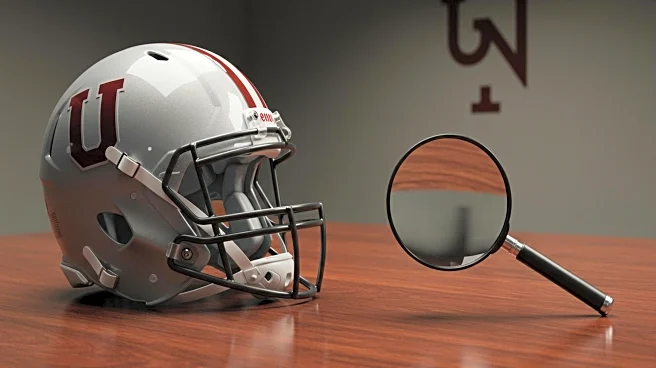What's Happening?
The NCAA has announced disciplinary actions against several individuals associated with the Michigan Wolverines football program following a sign-stealing investigation. Former head coach Jim Harbaugh, current head coach Sherrone Moore, former analyst Connor Stalions, and former director of player personnel Denard Robinson have been penalized. Harbaugh received a 10-year show-cause order, prohibiting him from athletically related activities starting August 2028. Moore faces a two-year show-cause order and a one-game suspension for the 2026 season. Stalions and Robinson received eight-year and three-year show-cause orders, respectively. The investigation revealed that these individuals repeatedly failed to comply and provided false information, leading to their categorization as 'trigger repeat violators.' Michigan's football program faces four years of probation, a $50,000 fine, and restrictions on recruiting activities.
Why It's Important?
The disciplinary actions against Michigan's football program highlight the NCAA's commitment to maintaining integrity in college sports. The penalties could impact Michigan's recruiting capabilities and overall team performance, affecting their competitiveness in the Big Ten Conference. The financial implications, including fines and reduced official visits, may strain the program's resources. The scandal also serves as a cautionary tale for other programs, emphasizing the importance of compliance with NCAA regulations. The reputational damage could influence future coaching hires and player recruitment, potentially altering the program's trajectory.
What's Next?
Michigan will need to navigate the probation period while adhering to NCAA restrictions. The program may face challenges in maintaining its competitive edge due to reduced recruiting opportunities. Stakeholders, including fans and alumni, may demand accountability and transparency from the university's athletic department. The NCAA's actions could prompt other programs to review their compliance practices to avoid similar penalties. Michigan's leadership will likely focus on rebuilding trust and ensuring adherence to regulations to prevent future violations.
Beyond the Headlines
The scandal raises ethical questions about the lengths to which programs might go to gain a competitive advantage. It underscores the need for robust compliance mechanisms within collegiate sports. The incident may lead to broader discussions about the culture of competitiveness in college athletics and the pressures faced by coaches and staff. Long-term, the scandal could influence policy changes within the NCAA to prevent similar occurrences.









